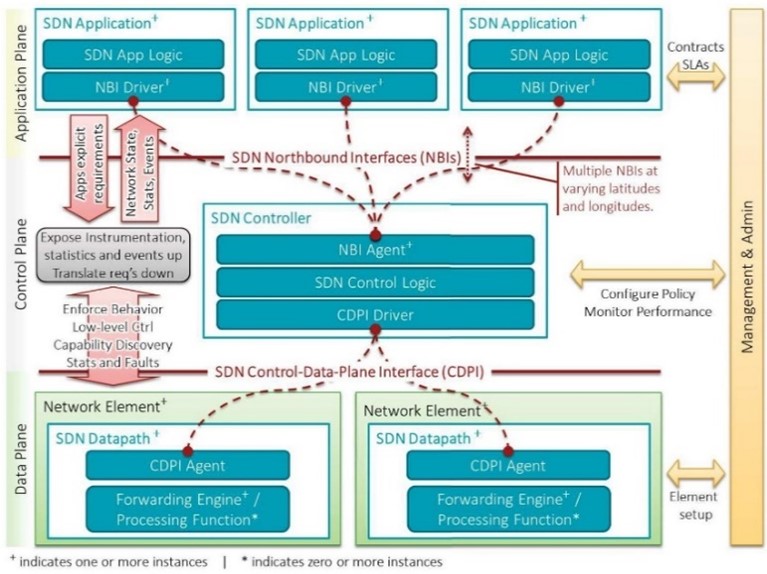สถาปัตยกรรมระบบเครือข่ายที่กำหนดโดยซอฟต์แวร์ ช่วยเพิ่มศักยภาพด้านความมั่นคงปลอดภัยของระบบเครือข่าย
Main Article Content
บทคัดย่อ
ระบบเครือข่ายที่กำหนดโดยซอฟต์แวร์ (Software-Defined Networks : SDN) เป็นสถาปัตยกรรมที่ทำให้ซอฟต์แวร์สามารถกำหนดการทำงานของเครือข่ายได้อย่างมั่นคงปลอดภัยโดยอัตโนมัติ วัตถุประสงค์ของบทความนี้เพื่อนำเสนอสถาปัตยกรรมระบบเครือข่ายที่กำหนดโดยซอฟต์แวร์ที่ช่วยเพิ่มศักยภาพด้านความมั่นคงปลอดภัยของระบบเครือข่าย โดยนำเสนอ 4 ประเด็นได้แก่ ประเด็นแรกคือ SDN เป็นระบบเครือข่ายที่สามารถรองรับการเขียนโปรแกรมเพื่อบริหารจัดการทรัพยากร (Resources) ของระบบเครือข่ายอย่างมีประสิทธิภาพทั้งด้านเวลาและความมั่นคงปลอดภัย ประเด็นที่สองอธิบายถึงโครงสร้างของสถาปัตยกรรมระบบเครือข่ายที่กำหนดโดยซอฟต์แวร์ประกอบด้วยสามชั้นและสองการเชื่อมต่อ ประเด็นที่สามอธิบายถึงความสำคัญของ SDN ต่อระบบเครือข่ายโดยประเด็นนี้จะแยกให้เห็นถึง ความพร้อมใช้งาน (Availability) ความน่าเชื่อถือ (Reliability) ความมั่นคงปลอดภัย (Security) และ ประสิทธิภาพ (Performance) ซึ่งประเด็นดังกล่าวสรุปไว้ชัดเจนและได้กล่าวถึงการออกแบบระบบเครือข่ายที่มีความมั่นคงปลอดภัย และประเด็นสุดท้ายได้อธิบายถึงแนวทางในการพัฒนา SDN เพื่อช่วยเพิ่มศักยภาพด้านความมั่นคงปลอดภัยให้กับระบบเครือข่าย ซึ่งได้นำเสนอแนวทางในการวิจัยที่จะเป็นประโยชน์ต่อระบบเครือข่ายในด้านความมั่นคงปลอดภัยและการเพิ่มประสิทธิภาพ ดังนั้นการวิจัยในเรื่อง การออกแบบระบบเครือข่ายที่กำหนดโดยซอฟต์แวร์ (SDN) จึงเป็นสิ่งสำคัญที่จะทำให้ระบบเครือข่ายมีความมั่นคงปลอดภัย สอดรับกับเทคโนโลยีของเครือข่ายแบบไดนามิก
Article Details

อนุญาตภายใต้เงื่อนไข Creative Commons Attribution-NonCommercial-NoDerivatives 4.0 International License.
วารสารวิทยาศาสตร์และวิทยาศาสตร์ศึกษา (JSSE) เป็นผู้ถือลิสิทธิ์บทความทุกบทความที่เผยแพร่ใน JSSE นี้ ทั้งนี้ ผู้เขียนจะต้องส่งแบบโอนลิขสิทธิ์บทความฉบับที่มีรายมือชื่อของผู้เขียนหลักหรือผู้ที่ได้รับมอบอำนาจแทนผู้เขียนทุกนให้กับ JSSE ก่อนที่บทความจะมีการเผยแพร่ผ่านเว็บไซต์ของวารสาร
แบบโอนลิขสิทธิ์บทความ (Copyright Transfer Form)
ทางวารสาร JSSE ได้กำหนดให้มีการกรอกแบบโอนลิขสิทธิ์บทความให้ครบถ้วนและส่งมายังกองบรรณาธิการในข้อมูลเสริม (supplementary data) พร้อมกับนิพนธ์ต้นฉบับ (manuscript) ที่ส่งมาขอรับการตีพิมพ์ ทั้งนี้ ผู้เขียนหลัก (corresponding authors) หรือผู้รับมอบอำนาจ (ในฐานะตัวแทนของผู้เขียนทุกคน) สามารถดำเนินการโอนลิขสิทธิ์บทความแทนผู้เขียนทั้งหมดได้ ซึ่งสามารถอัพโหลดไฟล์บทความต้นฉบับ (Manuscript) และไฟล์แบบโอนลิขสิทธิ์บทความ (Copyright Transfer Form) ในเมนู “Upload Submission” ดังนี้
1. อัพโหลดไฟล์บทความต้นฉบับ (Manuscript) ในเมนูย่อย Article Component > Article Text
2. อัพโหลดไฟล์แบบโอนลิขสิทธิ์บทความ (Copyright Transfer Form) ในเมนูย่อย Article Component > Other
ดาวน์โหลด ไฟล์แบบโอนลิขสิทธิ์บทความ (Copyright Transfer Form)
เอกสารอ้างอิง
Agborubere, B. and Sanchez-Velazquez, E. (2017). OpenFlow communications and TLS security in software-defined networks. Proceedings of 2017 IEEE International Conference on Internet of Things (iThings) and IEEE Green Computing and Communications (GreenCom) and IEEE Cyber, Physical and Social Computing (CPSCom) and IEEE Smart Data (SmartData), (pp. 560–566). Exeter: IEEE.
Bholebawa, I. Z. and Dalal, U. D. (2018). Performance analysis of SDN/OpenFlow controllers: POX versus floodlight. Wireless Personal Communications, 98(2), 1679–1699.
Feng, M., Mao, S. and Jiang, T. (2016). Enhancing the performance of future wireless networks with software-defined networking. Frontiers of Information Technology & Electronic Engineering, 17(7), 606–619.
Fernandez, C. and Munoz, J. L. (2019). Software Defined Networking (SDN) with OpenFlow 1.3 Open vSwitch and Ryu. Retrieved 7 May 2023, from UPC Telematics Department: https://upcommons. upc.edu/bitstream/handle/2117/77684/sdn-book.pdf.zip
Gong, Y., Huang, W., Wang, W. and Lei, Y. (2015). A survey on software defined networking and its applications. Frontiers of Computer Science, 9(6), 827–845.
Haleplidis, E., Hadi Salim, J., Denazis, S. and Koufopavlou, O. (2015). Towards a network abstraction model for SDN. Journal of Network and Systems Management, 23(2), 309–327.
Hu, Y., Wang, W., Gong, X., Que, X. and Cheng, S. (2015). On the feasibility and efficacy of control traffic protection in software defined networks. Science China Information Sciences, 58(12), 1–19.
Krishnan, P., Jain, K., Aldweesh, A., Prabu, P. and Buyya, R. (2023). OpenStackDP: a scalable network security framework for SDN-based OpenStack cloud infrastructure. Journal of Cloud Computing, 12(26), 1-42.
Li, D., Wang, S., Zhu, K. and Xia, S. (2017). A survey of network update in SDN. Frontiers of Computer Science, 11(1), 4–12.
Meng, W., Choo, K.-K. R., Furnell, S., Vasilakos, A. V. and Probst, C. W. (2018). Towards Bayesian-based trust management for insider attacks in healthcare software-defined networks. IEEE Transactions on Network and Service Management, 15(2), 761–773.
Nguyen, K. and Yamada, S. (2016). An experimental feasibility study on applying SDN technology to disaster-resilient wide area networks. Annals of Telecommunications, 71(11), 639–647.
Priyadarshini, R. and Barik, R. K. (2022). A deep learning based intelligent framework to mitigate DDoS attack in fog environment. Journal of King Saud University - Computer and Information Sciences, 34(3), 825–831.
Sophakan, N. and Sathitwiriyawong, C. (2019). A Secured OpenFlow-Based Software Defined Networking Using Dynamic Bayesian Network. Proceedings of 2019 19th International Conference on Control, Automation and Systems (ICCAS), (pp. 1517–1522). Exeter: IEEE.
Swami, R., Dave, M. and Ranga, V. (2020). Software-defined Networking-based DDoS Defense Mechanisms. ACM Computing Surveys, 52, 1–36.
Taha, M. (2023). An efficient software defined network controller based routing adaptation for enhancing QoE of multimedia streaming service. Multimedia Tools and Applications, 94(2), 1-24.
Tseng, Y., Zhang, Z. and Nait-Abdesselam, F. (2016). ControllerSEPA: A security-enhancing SDN controller plug-in for OpenFlow applications. Proceedings of 2016 17th International Conference on Parallel and Distributed Computing, Applications and Technologies (PDCAT), (pp. 268–273). Exeter: IEEE.
Wang, Y., Bi, J., Lin, P., Lin, Y. and Zhang, K. (2016). SDI: a multi-domain SDN mechanism for fine-grained inter-domain routing. Annals of Telecommunications, 71(11), 625–637.
Yan, Q., Yu, F. R., Gong, Q. and Li, J. (2016). Software-defined networking (SDN) and distributed denial of service (DDoS) attacks in cloud computing environments: A survey, some research issues, and challenges. IEEE Communications Surveys & Tutorials, 18(1), 602–622.
Yungaicela-Naula, N. M., Vargas-Rosales, C., Perez-Díaz, J. A. and Zareei, M. (2022). Towards security automation in Software Defined Networks. Computer Communications, 183, 64-82.


